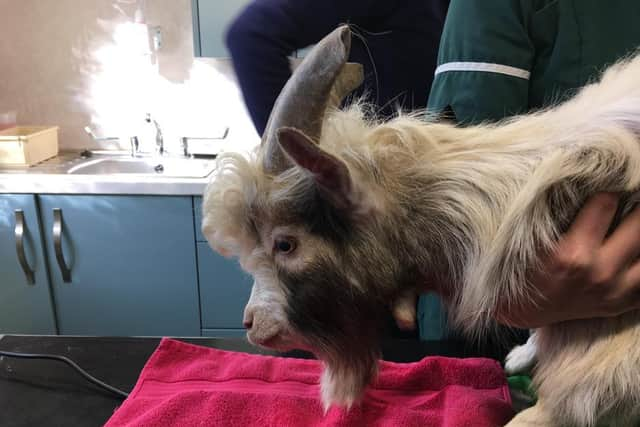The Yorkshire Vet Julian Norton performs a delicate operation on a goat called Elvis


One of them belonged to Ian. He ran a mobile farm, the purpose of which was to visit schools, taking a multitude of animals to help educate young children.
The goat was called ‘Starburst’ and it had a swelling on its lower jaw. Ian was worried because the swelling had reached the size of a golf ball. On a pigmy goat, this was approximately the equivalent to a football-sized lump on a person. I headed down the A1 to investigate, armed with a sharp needle, a scalpel and plenty of excitement.
Advertisement
Hide AdAdvertisement
Hide AdBut it wasn’t just Ian’s goat that had a problem. His new business was foundering. Coronavirus restrictions meant his trailer-load of interesting animals was housebound or, more accurately, farm-bound and the teaching, informing and enthusing of kids had ground to a halt.


The country’s recent and protracted lockdown was on the verge of claiming another victim. But, at least Starburst’s facial problem could be treated without frightening children.
Ian’s farm was amazing. Animals of all shapes and sizes emerged from the far corners of fields and pens as I drove into the yard. Runner ducks appeared first. Upright and lengthy and rubbish at flying but, as their names suggested, adept at running.
Ian explained how they were used in China to keep pests off rice plantations and in the vineyards of Italy to gobble up slugs. Apparently, they were more useful than their ridiculous appearance suggested. Next, there was a Polish chicken and a huge black turkey, which was doing her own gobbling, although not of slugs, as her baggy face wobbled side to side.
Advertisement
Hide AdAdvertisement
Hide AdAttention turned to the patient, Starburst. The lump was prominent, but I was confident of an easy fix. Catching the frisky goat was the hardest part. As predicted, a sharp scalpel and a firm squeeze gave immediate relief to goat and satisfaction to the farmer and vet.
Another goat presented himself later in the week. Elvis had a spectacular but unwanted pair of testicles. He also had an amazing hairdo, which was just like the flamboyant hair of Lord Flashheart from Blackadder. Curled and quiffed, Elvis’s locks were as impressive as the large testicles at the other end of his body – the area I’d be operating upon. Goats are unusual in their intolerance of local anaesthetic. Even a small dose of this useful, and usually benign, drug can cause instant death.
So, unlike in their ovine or bovine cousins, surgical procedures such as castration or jobs like removing the horn buds have to be done under full general anaesthetic.
This was why Elvis had visited the practice today. The procedure was more similar to the castration of a dog than that of a calf. I held my breath as I injected the drugs to send Elvis to sleep. Administering unusual anaesthetics to irregular species can be a risky business, but fortunately Elvis’s anaesthetic was smooth and uneventful, as was the removal. Elvis came around quickly and comfortably from the op. Nurses and vets appeared to admire the handsome goat and his testicles, which now resided in a kidney dish.
Advertisement
Hide AdAdvertisement
Hide Ad“Wow, what handsome…” exclaimed assorted staff. There were various words that followed. But, the op on the handsome goat, with handsome testicles was finished and before long, without a care in the world, Elvis had left the building.
Series 11 of The Yorkshire Vet continues at 8pm on Tuesdays on Channel 5.